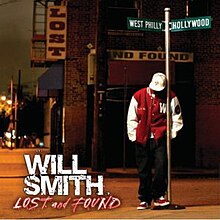Lost and Found (Will Smith album)
| Lost and Found | ||||
|---|---|---|---|---|
 |
||||
| Studio album by Will Smith | ||||
| Released | March 29, 2005 | |||
| Recorded | 2004–2005 | |||
| Studio |
|
|||
| Genre | Hip hop | |||
| Length | 55:05 | |||
| Label | Interscope | |||
| Producer |
|
|||
| Will Smith chronology | ||||
|
||||
| Singles from Lost and Found | ||||
|
||||
| Professional ratings | |
|---|---|
| Review scores | |
| Source | Rating |
| AllMusic | |
| Blender | |
| Entertainment Weekly | B+ |
| The Guardian | |
| PopMatters | 7/10 |
| Rolling Stone | |
| The Village Voice | Unfavorable |
Lost and Found is the fourth solo studio album by American rapper Will Smith. Recorded with a range of producers, including The Freshmen and Omarr "O. Banga" Rambert, it was released on March 29, 2005 by Interscope Records. The album reached number 6 on the US Billboard 200 and was certified Gold by the Recording Industry Association of America, making this Smith's third overall top ten album following Willennium in 1999 and his second gold-selling album following Born to Reign in 2002. The album also reached the top 20 on the UK Albums Chart. "Switch" and "Party Starter" were released as singles. It is currently Smith's last album to date.
The majority of recording for Lost and Found took place at The Boom Boom Room in Burbank, California, with additional sessions at The Studio in Philadelphia, Pennsylvania, The Cutting Room in New York City, New York, 1020 Sound Studios in Philadelphia, and Crescent Moon Studios in Miami, Florida. Almost all songs on the album were produced or co-produced by The Freshmen, or individual member Troy "Treezah" Johnson, with executive producer Omarr "O. Banga" Rambert producing much of Smith's vocals; DJ Jazzy Jeff, Kwamé, and more also contributed to production.
Writing a review of the album for the website AllMusic, Andy Kellman claimed that the lyrics on Lost and Found contribute to "the least party-oriented album Smith has made", blaming the poor sales performance of previous album Born to Reign and criticism by other rappers and radio personalities for making Smith "a little bitter".PopMatters writer Mike Schiller identifies a similar tone on the album, noting that Smith is "surprisingly confrontational" on much of the record, targeting subjects such as rap radio and other hip hop artists.Rolling Stone writer Christian Hoard noted that the lyrics on the album feature "lots of self-deprecating humor".
...
Wikipedia
